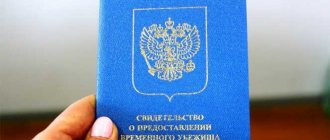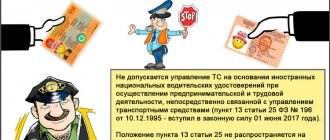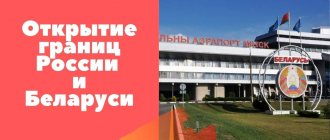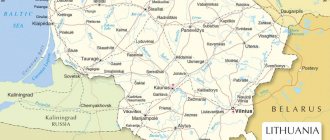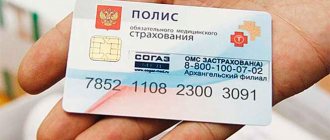General provisions
1. These Regulations regulate the provision of medical care to foreign citizens and stateless persons in the state budgetary healthcare institution “Volgograd Regional Clinical Perinatal Center No. 1 named after L.I. Ushakova”, Volzhsky (hereinafter referred to as the Institution) and was developed taking into account the Federal Law of November 21, 2011 N 323-FZ “On the fundamentals of protecting the health of citizens in the Russian Federation”, Federal Law of November 29, 2010 N 326-FZ “On compulsory health insurance in the Russian Federation”, Federal Law of July 25, 2002 N 115-FZ “On the legal status of foreign citizens in the Russian Federation”, Federal Law dated July 18, 2006 N 109-FZ “On migration registration of foreign citizens and stateless persons in the Russian Federation”, Resolution of the Government of the Russian Federation dated March 6, 2013 N 186 “On approval of the Rules for the provision of medical assistance to foreign citizens on the territory of the Russian Federation”, “Treaty on the Eurasian Economic Union”.
2. Foreign citizens permanently and temporarily residing and temporarily staying on the territory of the Russian Federation have the right to medical care in accordance with the legislation and relevant international treaties of the Russian Federation.
3. Stateless persons permanently residing in the Russian Federation enjoy the right to medical care on an equal basis with citizens of the Russian Federation, unless otherwise provided by international treaties of the Russian Federation.
4. If an international treaty of the Russian Federation establishes a different procedure for providing medical care to foreign citizens (stateless persons) than that provided for by the legislation of the Russian Federation and these Regulations, the rules of the international treaty apply.
5. The terms used in these Regulations mean the following:
"Medical assistance (emergency)"
— a range of medical services provided for sudden acute diseases, conditions, exacerbation of chronic diseases
without obvious signs of a threat to the patient’s life
;
"Medical assistance (emergency)"
— a complex of medical services provided in case of acute diseases, accidents, injuries, poisoning and other conditions that
pose a threat to the patient’s life.
Acts establishing standards for the provision of medical care to foreign citizens
Article 41 of the Constitution of the Russian Federation (fundamental law) states that everyone has the right to health care and medical care. It clearly follows from this norm that medical care is not limited to the scope of its provision only to Russian citizens.
Article 13, Part 3 of the Federal Law of November 21, 2011 No. 323-FZ “On the fundamentals of protecting the health of citizens in the Russian Federation” establishes that the right to medical care of foreign citizens living and staying on the territory of the Russian Federation is established by the legislation of the Russian Federation and the relevant international treaties of the Russian Federation. Federation.
The procedure for providing medical care to foreign citizens and stateless persons
1. To provide medical care to a foreign citizen (stateless person), the Institution must identify the identity of the foreign citizen (stateless person).
2. During the identification process, the employee performs the following actions:
2.1. Checking the citizen’s identity documents (if necessary, a document confirming the authority of the legal representative accompanying him).
2.2. Recording information about the citizen (his legal representative accompanying him) in medical documentation on paper or electronically.
2.3. Identification includes establishing the following information regarding a foreign citizen or stateless person:
a) last name, first name, and patronymic (if available);
b) citizenship (in relation to foreign citizens);
c) the day, month and year of birth of the citizen.
2.4. Details of the identity document.
2.5. Details of a migration card, a document confirming the right of a foreign citizen or stateless person to stay (reside) in the Russian Federation (residence permit or temporary residence permit).
2.6. Address of residence (registration) or place of stay.
2.7. Data from the contract (policy) of compulsory health insurance (for foreign citizens permanently or temporarily residing in the Russian Federation, stateless persons).
2.8. Data from a voluntary medical insurance agreement (policy) concluded with an insurance organization established in accordance with the legislation of the Russian Federation, or an agreement on the provision of paid medical services concluded with a medical organization located in a constituent entity of the Russian Federation, on the territory of which the citizen intends to carry out labor activities (for temporarily staying foreign citizens, stateless persons working in the territory of the Russian Federation).
3. For foreign citizens, an identification document is a passport of a foreign citizen or another document established by federal law or recognized in accordance with an international treaty of the Russian Federation as an identification document.
Documents proving the identity of a stateless person in the Russian Federation are:
a) a document issued by a foreign state and recognized in accordance with an international treaty of the Russian Federation as an identification document of a stateless person;
b) temporary residence permit;
c) residence permit;
d) other documents provided for by federal law or recognized in accordance with an international treaty of the Russian Federation as identification documents of a stateless person.
4. Before the provision of medical care, written informed voluntary consent to medical intervention is taken from a foreign citizen (stateless person) or the legal representative accompanying him.
If possible, the text of informed voluntary consent to medical intervention is offered to the patient - a foreign citizen (stateless person) in a language he understands.
In the absence or impossibility of obtaining informed voluntary consent for medical intervention in a foreign language, all mandatory information necessary for the patient - a foreign citizen (stateless person) to make a decision on medical intervention and reflected in the appropriate form is explained to him with the help of a professional translator invited by the Institution on a contractual basis with attributing the costs of interpreter services to the patient.
The form of informed voluntary consent for medical intervention must be certified with the signature of the patient - a foreign citizen (stateless person) or his legal representative, as well as the signature of the doctor who received the voluntary information consent from the patient.
If it is impossible to invite an interpreter or in the absence of an interpreter accompanying the patient - a foreign citizen (stateless person) due to the patient’s lack of information about the goals, methods of providing medical care, the associated risk, possible options for medical intervention, its consequences, as well as the results provided, medical intervention is necessary according to emergency indications to eliminate a threat to a person’s life and if his condition does not allow him to express his will, as well as in relation to persons suffering from diseases that pose a danger to others.
5. Medical documentation of a patient - a foreign citizen (stateless person) is filled out in Russian.
If it is necessary to translate documents of a medical nature and the interaction of medical personnel with the patient, such translation and interaction with the written consent of the patient (including the consent of the citizen or his legal representative to disclose information constituting medical confidentiality) by the Institution's translator (if available) a translator invited by the Institution on a contractual basis (by assigning the costs of interpreter services to the patient) or an interpreter accompanying the patient.
The translated medical documentation (a copy of the medical documentation in a foreign language) is sent or handed over to the patient.
6. After completing the treatment of a patient - a foreign citizen (stateless person), an extract from the medical documentation indicating the period of provision of medical care at the Institution, as well as the measures taken, is sent to his address or the address of a legal entity or individual representing his interests, in agreement with the specified citizen. on prevention, diagnosis, treatment and medical rehabilitation.
Medical documentation sent by the Institution to another state is completed in Russian.
7. If the Institution provides medical care to foreign citizens and stateless persons not registered in the compulsory medical insurance system, invoices for the actual medical care provided within 10 days after the end of treatment are sent by the Institution to the foreign citizen (stateless person) or legal or physical the person representing his interests, unless otherwise provided by the agreement in accordance with which it was provided.
Medical assistance to foreign citizens
The Federal State Autonomous Institution “National Medical Research Center for Children's Health” of the Ministry of Health of the Russian Federation has been providing highly qualified medical care to children for more than 255 years.
Since 2021, the Research Institute of Pediatrics of the Federal State Institution “National Medical Research Center for Children's Health” of the Ministry of Health of the Russian Federation is the only pediatric institution in the country with the status of a Partner Center of the World Health Organization WHO Collaborating Center for improving the quality of care for children.
In 2021, the Federal State Institution "National Medical Research Center for Children's Health" of the Ministry of Health of the Russian Federation was assigned the 1st category - scientific organizations - leaders (Order of the Ministry of Health of the Russian Federation No. 342 of June 14, 2018)
The Center employs 1,622 employees, many of whom are members of European specialized societies who regularly take part in scientific presentations at international medical conferences:
- Honored Doctor of the Russian Federation - 3
- Corresponding Member of the Russian Academy of Sciences - 4
- Honored Scientists of the Russian Federation - 4
- professors - 24
- doctors of medical sciences - 68
- candidates of medical sciences - 149
The center provides highly qualified medical care to foreign citizens in accordance with international standards, applying a unique integrated approach to the issues of prevention, diagnosis, high-tech treatment and rehabilitation of children aged from birth to 18 years:
- Consultations with specialists in more than 38 pediatric specialties : allergology-immunology, vaccinology, gastroenterology, genetics, gynecology, dermatology, defectology, dietology and nutrition, cardiology, cardiac surgery, cosmetology, speech therapy, exercise therapy, mammology, neurology, neonatology, nephrology, orthodontics, orthopedics and traumatology, otorhinolaryngology, ophthalmology, pediatrics, psychiatry, psychology, pulmonology, proctology, rheumatology, dentistry, audiology, uroandrology, urology, physiotherapy, surgery, maxillofacial surgery, endocrinology;
- Professorial reception of leading Russian specialists in the field of children's healthcare - opinion leaders - composition of professors from the Federal State Institution "National Medical Research Center for Children's Health" of the Ministry of Health of the Russian Federation, who use in their work advanced scientific and practical methods of diagnosis and complex treatment of complex clinical cases and serious diseases in children: Elena Nikolaevna Basargina - Doctor of Medical Sciences, Professor, Head of the Cardiology Department of the National Medical Research Center for Children's Health of the Russian Ministry of Health, Vice-President of the Russian Association of Pediatric Cardiologists.
- Zorkin Sergey Nikolaevich – Doctor of Medical Sciences, Professor, Head of the Urology Department with Reproductology and Transplantation Groups of the National Medical Research Center for Children's Health of the Russian Ministry of Health, member of the European Society of Pediatric Urologists, author of scientific works in Scopus, Web of Science.
- Svetlana Borisovna Lazurenko – Doctor of Pedagogical Sciences, Professor, Head of the Center for Psychological and Pedagogical Assistance in Pediatrics of the National Medical Research Center for Children's Health of the Russian Ministry of Health, member of the European Association of Mental Health.
- Potapov Alexander Sergeevich – Doctor of Medical Sciences, Professor, Chief Researcher of the Gastroenterological Department with the Hepatology Group of the Federal State Institution "National Medical Research Center for Children's Health" of the Ministry of Health of the Russian Federation, member of the European Organization for the Study of Crohn's Disease and Ulcerative Colitis (ECCO), European Society of Pediatric Gastroenterology, Hepatology and nutrition (ESPGHAN), European Association for the Study of the Liver (EASL), full member of the Russian Academy of Sciences (RAN).
- Polyakov Sergey Dmitrievich – Doctor of Medical Sciences, Professor, Sports Medicine Doctor.
- Rusetsky Yuri Yuryevich - MD, PhD, Professor, Head of the Otorhinolaryngology Department with a surgical group for head and neck diseases of the Federal State Institution "National Medical Research Center for Children's Health" of the Ministry of Health of the Russian Federation, full member of the European Academy of Facial and Plastic Surgery, the European Society of Rhinologists, the Executive Committee of the Russian Society of Rhinologists , member of the editorial board of the journal “Folia otorhinolaryngologiae et pathologiae respiratoriae”.
- Aleksey Nikolaevich Tsygin – Doctor of Medical Sciences, Professor, Head of the Nephrology Department of the Federal State Institution “National Medical Research Center for Children’s Health” of the Russian Ministry of Health, represented Russia on the Council of the International Association of Pediatric Nephrology (IPNA) from 2000 to 2007. He is the owner of awards and grants: Educational grant of the International Association of Pediatric Nephrology IPNA (1991), Diploma and award from the National Kidney Foundation of the USA for 2nd place in the First Annual Competition of Trainees and Graduate Students (Washington DC, 1991), IPNA Honorary Diploma (2007), Humanitarian Award L. & Sophia Hobbs Humanitarian Award (Cystinosis Foundation) 2010.
- Sergey Pavlovich Yatsyk – MD, PhD, Professor, Head of the Institute of Pediatric Surgery of the Federal State Institution "National Medical Research Center for Children's Health" of the Ministry of Health of the Russian Federation, member of the International Association for Hypospadias and Sex Disorders (ISHID), the European Association of Pediatric Urologists (ESPU).
- Diagnostics for children and adults using the latest expert-class medical equipment from global manufacturers;
- Wide range of next generation genetic studies;
- Family vaccination with Russian and imported vaccines;
- Effective comprehensive check-up, treatment and rehabilitation programs for children in a day hospital format;
- Annual programs of medical observation of children at home and in the clinic by leading pediatricians of the Federal State Institution "National Medical Research Center for Children's Health" of the Ministry of Health of the Russian Federation;
- Outpatient surgery in a one-day hospital;
- Hospitalization in specialized pediatric departments of the Research Institute of Pediatrics
The Federal State Institution "National Medical Research Center for Children's Health" of the Ministry of Health of the Russian Federation provides unique types of medical services:
- Magnetic resonance imaging (MRI):
- studies for children from the first day of life, if necessary with anesthesia;
- unique techniques: MR enterography, whole body MRI, cardiac MRI, MR mammography;
- structural and functional studies of the brain, including neuroprotocols and “epi” modes on the Discovery MR750 – 3.0 Tesla device;
- conducting research for large patients (up to 140 kg), as well as prenatal diagnostics (fetal MRI) using a device with a wide aperture “Optima 450w - 1.5 Tesla”;
- MR examinations with comfort for patients suffering from claustrophobia, using an open-type device “Signa Excite Ovation - 0.35 Tesla”.
- Endoscopic examinations of the gastrointestinal tract and respiratory tract:
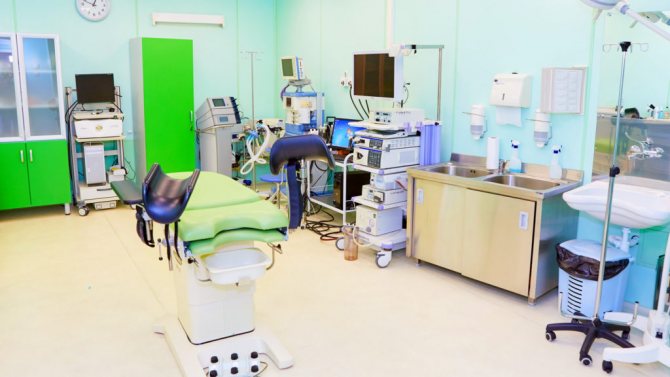
- one of the few leading endoscopic departments in Russia, where balloon dilatation of esophageal strictures is performed for children with epidermolysis bullosa;
- confocal laser endomicroscopy (CLEM) – ultra-high magnification endoscopy (up to 1,000 times), provides the opportunity to evaluate the microstructure of tissue down to the cell nucleus;
- endoscopic manipulations under general anesthesia (“in sleep”).
- Comprehensive breast examination programs for children and adults in one visit:
- digital mammography;
- tomosynthesis (3D mammography):
- contrast mammography (intravenous spectral mammography - CESM);
- digital mammography with implants;
- ductography;
- Ultrasound of the mammary glands;
- diagnostic puncture;
- MRI with contrast.
- New generation genetic research:
- diagnosis of most currently known hereditary diseases;
- a unique research method for Russia - diagnosis of cystinosis by measuring the concentration of cystine in blood leukocytes using HPLC-MS/MS;
- selective screening of hereditary metabolic diseases on the Tandem mass spectrometer 3200 Qtrap (ABSciex), which is also used in a number of European countries for neonatal screening.
*Laboratory of molecular genetics and cell biology of the National Medical Research Center for Children's Health of the Russian Ministry of Health from 2012 to 2021. developed the diagnosis of more than 1,000 diseases using Sanger sequencing, reaching the level of leading laboratories in the world. Since 2013, he has been a participant in the project for external laboratory quality control ERNDIM (European Research Network for evaluation and improvement of screening, Diagnosis and treatment of Inherited disorders of metabolism).
- Family vaccine prevention with a focus on world immunization standards:

- Individual approach when drawing up a vaccination schedule for children with health problems (children of health groups 2, 3, 4; with perinatal pathology; with severe neurological pathology; with oncohematological diseases; with chromosomal diseases and rare diseases; children vaccinated before organ transplantation) ;
- Vaccinal prevention of disabled children on an individual schedule using modern foreign-made vaccines;
- Vaccinal prevention of the adult population.
Medical care for foreign citizens temporarily staying or permanently residing in the Russian Federation is provided at the Federal State Institution "National Medical Research Center for Children's Health" of the Ministry of Health of the Russian Federation in accordance with the Decree of the Government of the Russian Federation of March 6, 2016 No. 186 "On approval of the rules for providing medical care to foreign citizens on the territory of the Russian Federation" .
- foreign citizens who are insured persons in accordance with the Federal Law “On Compulsory Medical Insurance in the Russian Federation” have the right to free medical care within the framework of compulsory medical insurance;
- Medical assistance to foreign citizens is provided in accordance with agreements on the provision of paid medical services or voluntary health insurance agreements.
View the Price List of paid medical and non-medical services:
Connect with us:
+7,,
Medical services are provided by the Federal State Institution "National Medical Research Center for Children's Health" of the Ministry of Health of the Russian Federation on the basis of the list of works (services) that constitute medical activities and specified in the license for medical activities No. FS-99-01-009707 dated December 19, 2021 by the Federal Service for Surveillance in Healthcare (location: 109074, Moscow, Slavyanskaya Square, 4, building 1; tel. +7,).
Paid medical and non-medical services of the RUSSIA MINISTRY OF HEALTH are provided on the basis of the Decree of the Government of the Russian Federation of October 4, 2012 No. 1006 “On approval of the Rules for the provision of paid medical services by medical organizations”, Regulations on the procedure and conditions for the provision of paid medical services and paid non-medical services of the Ministry of Health of the Russian Federation.
Scope of medical care for foreign citizens and stateless persons
1. Emergency medical care for sudden acute diseases, conditions, exacerbation of chronic diseases that pose a threat to the patient’s life is provided by the Institution to foreign citizens and stateless persons free of charge.
2. Foreign citizens and stateless persons who are insured persons in the compulsory medical insurance system have the right to free medical care in the Institution within the framework of compulsory health insurance.
3. Ambulance, including specialized emergency medical care, is provided to foreign citizens in case of illnesses, accidents, injuries, poisoning and other conditions requiring urgent medical intervention free of charge (by the organization of state and municipal healthcare systems).
4. Medical care in an emergency form (with the exception of emergency, including emergency specialized medical care) and planned form is provided by the Institution to foreign citizens and stateless persons in accordance with agreements on the provision of paid medical services or agreements on voluntary medical insurance and (or) contracts concluded in favor of foreign citizens and stateless persons insured in the compulsory medical insurance system in the field of compulsory health insurance.
5. Medical care in a planned form is provided by the Institution, subject to the submission by a foreign citizen (stateless person) of written guarantees of fulfillment of the obligation to pay the actual cost of medical services or prepayment of medical services based on the expected volume of provision of these services (except for cases of provision of medical care to foreign citizens and stateless persons insured in the compulsory medical insurance system), as well as the necessary medical documentation (extract from the medical history, data from clinical, radiological, laboratory and other studies), if available.
Providing medical care to foreign citizens on a paid basis
Regarding the obligation of a medical organization to provide medical care, including paid care, it is necessary to refer to the provisions of civil legislation on an agreement for the provision of paid services (Article 782 of the Civil Code of the Russian Federation (hereinafter referred to as the Civil Code of the Russian Federation), and also recall the ruling of the Constitutional Court of the Russian Federation dated 06.06.2002 No. 115-O.

So, in accordance with the provisions of paragraph 4 of part 1 of article 2 of the Civil Code of the Russian Federation, the rules established by civil legislation apply to relations involving foreign citizens, stateless persons and foreign legal entities, unless otherwise provided by federal law.
Federal Law of July 25, 2002 No. 115-FZ “On the legal status of foreign citizens in the Russian Federation” and Federal Law of November 21, 2011 No. 323-FZ “On the fundamentals of protecting the health of citizens in the Russian Federation” any provisions on the application of civil legislation in relation to foreign citizens, in particular, regarding legal relations regarding the provision of paid services, has not been established. Thus, the provisions on the agreement on the provision of paid services, which includes the agreement on the provision of paid medical services, can also be applied to foreign citizens.
It should be noted that the Constitutional Court of the Russian Federation (determination dated 06.06.2002 No. 115-O) established that the agreement on the provision of paid medical services (medical care) in accordance with clause 1 of Art. 426 of the Civil Code of the Russian Federation is recognized as a public contract, i.e. an agreement concluded by a commercial organization and establishing its obligations to provide services that such an organization, by the nature of its activities, must provide to everyone who applies to it. In addition, recognizing the right of a medical institution to unilaterally refuse to fulfill obligations, despite the fact that it has the opportunity to provide the corresponding services, would not only lead to an undue restriction of the constitutional right to health care and medical care, but would also mean an excessive restriction (diminution) constitutional freedom of contract for a citizen entering into an agreement for the provision of medical services would create inequality that is unacceptable from the point of view of the requirements of justice, and, therefore, would violate the requirements of Articles 34, 35 and 55 (Part 3) of the Constitution of the Russian Federation.
Follow us
Subscribe to the newsletter and be the first to receive the latest and most relevant information from the Faculty of Medical Law.
By submitting an application, you agree to the terms of processing and use of personal data.
Thus, if a medical organization intends to refuse a citizen the provision of medical services, both in relation to citizens of the Russian Federation and in relations with foreign citizens, one should proceed from the impossibility of ensuring the safety and quality of medical services, the presence of contraindications and (or) other obvious technical and organizational the impossibility of providing such a service (we previously wrote about this in the article “Refusal of treatment for a patient: right or wrong?” dated December 18, 2014).
On the provision of medical care to members of the EAEU and members of their families
1. This Protocol was developed in accordance with Section XXVI of the Treaty on the Eurasian Economic Union and regulates the provision of medical care to workers of the member states and family members of the Republic of Belarus, the Republic of Kazakhstan and the Republic of Armenia, these states are members of the Union and Parties to the EAEU Treaty (hereinafter - members of the EAEU)
2. Concepts used in this section
, mean the following:
“state of permanent residence” - the state of which the patient is a citizen;
“patient” is a worker of a Member State or a family member who is receiving medical care or who has applied for medical care, regardless of the presence of diseases or their condition;
“Medical care (emergency)” is a complex of medical services provided for sudden acute diseases, conditions, exacerbation of chronic diseases without obvious signs of a threat to the patient’s life;
“Medical care (emergency)” is a complex of medical services provided in case of acute diseases, accidents, injuries, poisoning and other conditions that pose a threat to the patient’s life.
3. The Russian Federation ensures the provision of medical care to members of the EAEU in the manner and under the conditions determined by the legislation of the Russian Federation and international treaties.
4. The Russian Federation on its territory provides members of the EAEU with the right to receive free emergency medical care (in emergency and emergency forms) in the same manner and under the same conditions as citizens of the Russian Federation.
Medical assistance (in emergency and urgent forms)
It is provided to members of the EAEU at the State Budgetary Healthcare Institution "VOKPTS No. 1", Volzhsky, free of charge, regardless of the presence of a medical insurance policy.
Reimbursement of expenses of the State Budgetary Healthcare Institution “VOKPTs No. 1”, Volzhsky, for the provision of medical care (in emergency and emergency forms) to members of the EAEU is carried out at the expense of the relevant budgets of the budgetary system of the Russian Federation in accordance with the current health care financing system.
5. If the patient’s treatment continues at the State Budgetary Institution “VOKPTs No. 1”, Volzhsky, after eliminating the immediate threat to his life or the health of others, payment for the actual cost of the services provided is carried out directly by the patient or from other sources not prohibited by the legislation of the state of employment, at tariffs or negotiated prices.
FAQ
— Waiting times for emergency primary health care should not exceed 2 hours from the moment of application
patient to a medical organization;
— The waiting period for the provision of specialized (with the exception of high-tech) medical care, including for persons in inpatient social service organizations, should not exceed
14 working days from the date the attending physician issued a referral
for hospitalization, and for patients with cancer -
7 working days days from the moment of histological verification
of the tumor or from the moment of establishing a preliminary diagnosis of the disease (condition);
— The waiting period for an appointment with local therapists, general practitioners (family doctors), and local pediatricians is no more than 24 hours from the date of the patient’s application
to a medical organization;
— The timing of consultations with medical specialists is no more than 14 working days from the date of the patient’s request
to a medical organization, in case of suspected cancer, should not exceed 3 working days;
— The timing of diagnostic instrumental (radiographic studies, including mammography, functional diagnostics, ultrasound) and laboratory tests in the provision of primary health care – no more than 14 working days from the date of appointment
;
— The timing of computed tomography (including single-photon emission computed tomography), magnetic resonance imaging and angiography is no more than 14 working days from the date of appointment
;
— The time frame for conducting diagnostic instrumental and laboratory tests in case of suspected cancer should not exceed 7 working days from the date of ordering the tests
;
— The arrival time of ambulance teams when providing emergency medical care should not exceed 20 minutes from the moment of its call
. In territorial programs, the arrival time of emergency medical teams can be reasonably adjusted taking into account transport accessibility, population density, as well as climatic and geographical features of the regions.
Attention! The specified terms for the provision of medical services are determined by the Program of State Guarantees of Free Medical Care to Citizens. Within the framework of the Territorial Compulsory Health Insurance Program, these deadlines may be adjusted. For information relevant to your region, please contact the SOGAZ-Med contact center by calling 8-800-100-07-02 (toll-free).
